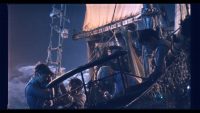
Newsletter May 2021

The German film distributor Filmverlag der Autoren came into being on 18 April 1971. Along with Fassbinder, its 24 founders included Peter Lilienthal, Hans W. Geißendörfer and Wim Wenders. Inspired by the likewise collectively organized publisher Verlag der Autoren, the distributor established an alternative model within the German film industry. One half of the profits went to the directors, while the other half was used, for example, to finance new films.
To mark the distributor’s fiftieth birthday, the radio broadcaster Deutschlandfunk has once again looked back at its history: “Unlike the directors of the French New Wave, young German filmmakers could not insert themselves in an evolved film structure. […] The aim of Filmverlag der Autoren was to bear risk collectively.” Its areas of focus were New German Cinema, directorial debuts and international auteur cinema.
The reason for the notorious underfunding of the distributor, which was acquired by the Kinowelt group (today: Studiocanal) in 1999, is seen by film critic Fritz Göttler as above all due to external circumstances. “The basic idea was of course a good one, but it would only have been able to function if we had really had a healthy film business.” The entire text can be read at: https://bit.ly/3xV4FIV
One year before the founding of Filmverlag der Autoren, Michael Verhoeven caused a stir at the Berlin Film Festival with his film O.K. (1970). The film is based on a war crime known as the “Incident on Hill 192,” which the director has his actors play out in Bavarian dialect and with a self-reflexive quality. The film features a performance by the 15-year-old Eva Mattes, who went on to appear in several Fassbinder films.
Jury president George Stevens in particular objected to what he saw as the film’s anti-Americanism. His attempts to have O.K. removed from competition were resisted by fellow jury member Dušan Makavejev, who decided to make the dispute public. Even before the jury resigned two days prior to the official end of the festival, numerous directors withdrew their films in protest, including Fassbinder, who withdrew WHY DOES HERR R. RUN AMOK? (1970). A DVD of O.K. has just been released as part of the Edition Filmmuseum series and can be purchased on the label’s website: https://bit.ly/3exSfim
Bertrand Mandico’s cinematic fever dream THE WILD BOYS (2017) is currently available in broadcaster ARTE’s online film archive. In the film, five violent youths land on a mysterious island populated by strange plants which intoxicate the senses and cause bodies to mutate. The film is packed with imaginatively intertwined references. The plot recalls William Golding’s “Lord of the Flies” and Anthony Burgess’s “A Clockwork Orange,” while the look of the film recalls the work of queer underground pioneers such as Kenneth Anger, Jean Genet and James Bidgood. Mandico also cites Fassbinder’s QUERELLE (1982), with its studio aesthetic and gloomy romanticism of the sailor milieu, as an influence. The film is available online until 19 July: https://bit.ly/3o7PWWA (German) or https://bit.ly/3tzHgt6 (French)
On 25 April a symposium was held online to discuss the protest that prevented the world premiere of Fassbinder’s play “Garbage, the City and Death” in 1985. The protest involved members of Frankfurt am Main’s Jewish community occupying the stage of the Schauspiel Frankfurt to object to what they saw as the play’s anti-Semitic portrayal of the character of the “wealthy Jew.” Judith von Sternburg has written a summary of several of the lectures for the Frankfurter Rundschau: https://bit.ly/3bkLrCy
For the author the event was “an example of how important and rewarding but also how difficult, indeed well nigh impossible” it is to initiate a new conversation about the play and the protest. “On the one hand, there is a lot put on the table at the historical site of the protest. On the other hand, it is put on the table successively.” For those seeking to form their own opinion of this historic event and its aftermath, all the lectures are available on YouTube: https://bit.ly/3y5Gbga
One date Fassbinder fans can look forward to is 10 September, when the exhibition “The Rainer Werner Fassbinder Method – A Retrospective” will finally open in the Bundeskunsthalle in Bonn, after being postponed twice due to COVID-19. The show, for which the gallery has collaborated with the Deutsches Filminstitut & Filmmuseum (DFF) and the Fassbinder Foundation, offers a “comprehensive portrait of the great German filmmaker” and endeavors to link his work “graphically with the realities of life in Germany at the time.”
The Frankfurter Allgemeine Zeitung has published a conversation between Eva-Maria Magel and the curators Isabelle Bastian and Hans-Peter Reichmann about the preparation of the show (https://bit.ly/3eBJq7i). The Bonn exhibition will present a number of items from Fassbinder’s estate, which was transferred to the DFF on permanent loan in 2018: “facsimiles to leaf through, […] film segments […], interviews, photos, memories.” The exhibition will run to 6 March 2022, thus ending shortly before the fortieth anniversary of Fassbinder’s death on 10 June. More information on the exhibition is available at: https://bit.ly/3ylYOfK
Finally, we have a request for our readers. The Fassbinder Foundation is currently looking for someone to join our sales administration. The position needs to be filled by September 2021 and the actual advertisement can be found at: https://bit.ly/3feg8um We would be very grateful to readers who could pass on this information to any potential applicants.
We wish our readers and friends a relaxing break over Whitsun and hope that the coming summer will be a good one. We will return again soon with more news from the world of Rainer Werner Fassbinder.
More on the films of Rainer Werner Fassbinder:
http://www.fassbinderfoundation.de/filme-von-fassbinder/?lang=en
More on the stage plays of Rainer Werner Fassbinder:
http://www.fassbinderfoundation.de/theaterstucke/?lang=en
Photo on the left: Michael Verhoeven’s O.K. © Edition Filmmuseum
Photo on the right: Bertrand Mandico’s THE WILD BOYS © Ecce Films